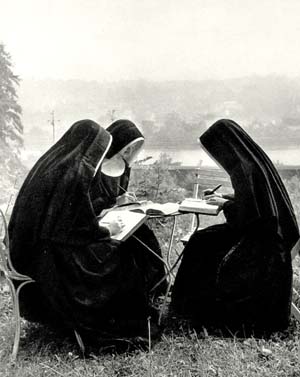 |
The Saint of the Day
St. Jane Frances de Chantal, August 21
Prof. Plinio Corrêa de Oliveira
Biographical selection:
St. Jane Frances de Chantal (1572-1641) was the widow of the Baron of Chantal. She founded the Order of the Visitation with St. Francis of Sales.

St. Jane Frances de Chantal
founded the Order of the Visitation
|
The day to bid farewell to leave her family members to found the Convent had arrived. The holy widow lived with her father-in-law the Baron of Chantal in Monthelon. She went to him, knelt before him and asked his blessing, his forgiveness, and his protection for her son. The 86-year-old Baron was saddened by her departure, but embraced his daughter-in-law and wished her happiness.
Afterward, she knelt before her father, Monsieur Fremiot, President of the Parliament of Burgundy, to ask his blessing. He said: “My God, it does not belong to me to change Thy designs. If it did, I would ask Thee to let me keep my daughter with me. Instead I offer to Thee this beloved daughter. Receive and console her.” Then he blessed her.
She was also very much loved by the poor and all the inhabitants of Monthelon, who publicly manifested their sorrow at her departure. She had received Holy Eucharist in Dijon to fortify herself for the coming separation from her 14-year-old son. The young man ran to her and embraced her, locking his arms around her neck, trying to move her heart to change her mind, but without success. He then went to the door and barred his mother’s way by lying across the threshold. “Since I am too weak to stop you,” he said, “you will have to step over your only son to abandon him.” The saint wept bitterly, but did not waver in her resolve.
Her serenity restored, she told those present: “I ask you to forgive my weakness in weeping, for I am leaving my son and my father forever, but I will find my God everywhere.”
Comments of Prof. Plinio:
One can see the tragic aspect of the scene. St. Jane Frances de Chantal was a widow and an extremely good person, carrying out her family duties in a way that attracted the friendship and affection of everyone. If it were a revolutionary family of our days, she would be persecuted; but it was a very good family, so she was esteemed by all the members. She was the emotional support of her father-in-law, her father, and her son. Until that moment she had been a splendid family member and had earned the general affection of the household as well as the inhabitants of Monthelon, where she lived.
God gave her a new vocation and asked her to rip herself asunder from all those legitimate and even holy bonds in order to be the founder of a new contemplative religious family. From then on, she would no longer be able to see her relatives.
The tragic aspect of the scene is placed in relief with the leave-taking of her father-in-law: she knelt before the 86-year-old man and asked his forgiveness for whatever wrong she had done him and asked his blessing. Then came the farewell to her father: again tears, again kneeling before him. The old man, like a figure in a Greek tragedy, offered his daughter to God. And then came the dramatic scene with her son hanging on her neck asking her not to leave, not to go away to the convent. Unsuccessful, he lay down on the threshold to show his dissent and to force her to walk across his body to leave. All these acts are deeply tragic.
Such tragedy was a consequence of a profoundly serious mentality about life, and particularly the religious life. It reflects a sense of the gravity of things, a great sense of what the cross represents, of what religious renunciation represents. The person who was called to a religious vocation had the sense of the serious relationship with Our Lord Jesus Christ she was entering into. Such seriousness accepted with a supernatural outlook also gives a great serenity, as we can see in the final episode of St. Jane Frances de Chantal’s farewell.

"Many convents of our days have a Mardi-Gras atmosphere."
Above, sisters from 115 American congregations "line dance" at a conference in Chicago (June 2002) discussing the future of religious life.
National Catholic Reporter, July 5, 2002 |
Today people have lost this sense of solemnity and seriousness. Almost everything is superficial, vacuous, received with a pasted-on smile used for every occasion. Without this spirit of gravity, even religious life has changed. It is very rare to still find that old recollection common in convents past. The life of the sisters thus often lost its significance. Instead of looking for the cross of Our Lord, the sisters are more frequently turned toward their own self-satisfaction and happiness. If you add today's tendency to adapt convents to the modern world stimulated by progressivist ecclesiastical authorities, you have the many convents of our day with their Mardi-Gras atmosphere. It is the very opposite of the time of St. Jane Frances de Chantal.

Seriousness about life and religion gives a great serenity. Above, pre-conciliar nuns at recreation.
|
What is the lesson we can take from the life of St. Jane Frances? We should imitate her profundity of spirit.
• First, she understood that the life of a family is a wonderful thing, something desired by God.
• Second, she understood that the glory of that life is to have some children who become religious, missionaries, apostles and warriors. When the family has this fruit, it transcends itself and touches on a higher reality.
• Third, the whole environment in which St. Jane Frances de Chantal lived was impregnated with the same Catholic spirit of sacrifice.
• Fourth, this profundity of spirit prepares the soul to love God. Our Lord said that the Kingdom of Heaven belongs to the violent. The violence Our Lord asks of us can be seen in the life of St. Jane Frances de Chantal. It is a fruit of her profundity of spirit.
Let us ask her to grant us the same profound spirit of Faith that she had.


  | | Prof. Plinio Corrêa de Oliveira | |
The Saint of the Day features highlights from the lives of saints based on comments made by the late Prof. Plinio Corrêa de Oliveira. Following the example of St. John Bosco who used to make similar talks for the boys of his College, each evening it was Prof. Plinio’s custom to make a short commentary on the lives of the next day’s saint in a meeting for youth in order to encourage them in the practice of virtue and love for the Catholic Church. TIA thought that its readers could profit from these valuable commentaries.
The texts of both the biographical data and the comments come from personal notes taken by Atila S. Guimarães from 1964 to 1995. Given the fact that the source is a personal notebook, it is possible that at times the biographic notes transcribed here will not rigorously follow the original text read by Prof. Plinio. The commentaries have also been adapted and translated for TIA’s site.
|
Saint of the Day | Home | Books | CDs | Search | Contact Us | Donate

© 2002- Tradition in Action, Inc. All Rights Reserved
|
 |

|